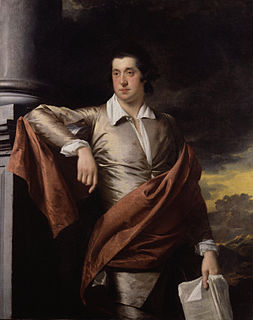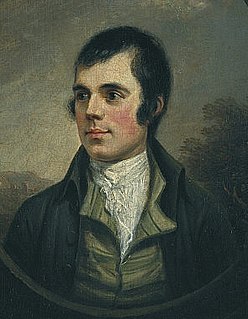Related Research Articles

Thomas Robert Malthus was an English cleric, scholar and influential economist in the fields of political economy and demography.

The Scottish Enlightenment was the period in 18th- and early-19th-century Scotland characterised by an outpouring of intellectual and scientific accomplishments. By the eighteenth century, Scotland had a network of parish schools in the Lowlands and four universities. The Enlightenment culture was based on close readings of new books, and intense discussions took place daily at such intellectual gathering places in Edinburgh as The Select Society and, later, The Poker Club, as well as within Scotland's ancient universities.

Scottish literature is literature written in Scotland or by Scottish writers. It includes works in English, Scottish Gaelic, Scots, Brythonic, French, Latin, Norn or other languages written within the modern boundaries of Scotland.

Thomas Day was a British author and abolitionist. He was well known for the book The History of Sandford and Merton (1783–1789) which emphasized Rousseauvian educational ideals.

John Abraham Heraud (1799–1887) was an English journalist and poet. He published two extravagant epic poems, The Descent into Hell (1830), and The Judgment of the Flood (1834). He also wrote plays, and travel books.

Samuel Johnson (1649–1703) was an English clergyman and political writer, sometimes called "the Whig" to distinguish him from the author and lexicographer of the same name. He is one of the best known pamphlet writers who developed Whig resistance theory.

Malcolm Laing was a Scottish historian, advocate and politician.
-- first stanza of Julia Ward Howe's Battle Hymn of the Republic conceived as both poem and lyrics to a popular tune and first published in February in The Atlantic Monthly
Rev John Logan FRSE (1748–1788) was a minister in Leith, Scotland, a popular preacher known also as a historian. Self-destructive behaviour saw him end his life as a hack writer in London.
George Harvey, Esq., was an English mathematician, known for his scientific and engineering writings, on meteorology, ship building, and colour blindness.
William Stevenson (1772–1829) was a Scottish nonconformist preacher, tutor and official, now known as a writer and father of Elizabeth Gaskell.

Gilbert Stuart (1742–1786) was a Scottish journalist and historian.
The Edinburgh Magazine and Review was a Scottish periodical, published monthly from 1773 to 1776. It was founded by Gilbert Stuart, who pursued an aggressive editorial line that eventually led to the magazine's demise.
Thomas Hinton Burley Oldfield (1755–1822) was an English political reformer, parliamentary historian and antiquary. His major work, The Representative History, has been called "a domesday book of corruption".
John Obadiah Justamond (1737–1786) was an Anglo-French surgeon and writer.
Joseph Lowe was a Scottish journalist and political economist. He is now known for his pioneer treatment of indexation, and Maurice Kendall called him the generally recognised "father of index numbers".

Samuel Vaughan (1720–1802) was an English merchant, plantation owner, and political radical.
John Cazenove (1788–1879) was an English businessman and political economist.

Scots-language literature is literature, including poetry, prose and drama, written in the Scots language in its many forms and derivatives. Middle Scots became the dominant language of Scotland in the late Middle Ages. The first surviving major text in Scots literature is John Barbour's Brus (1375). Some ballads may date back to the thirteenth century, but were not recorded until the eighteenth century. In the early fifteenth century Scots historical works included Andrew of Wyntoun's verse Orygynale Cronykil of Scotland and Blind Harry's The Wallace. Much Middle Scots literature was produced by makars, poets with links to the royal court, which included James I, who wrote the extended poem The Kingis Quair. Writers such as William Dunbar, Robert Henryson, Walter Kennedy and Gavin Douglas have been seen as creating a golden age in Scottish poetry. In the late fifteenth century, Scots prose also began to develop as a genre. The first complete surviving work is John Ireland's The Meroure of Wyssdome (1490). There were also prose translations of French books of chivalry that survive from the 1450s. The landmark work in the reign of James IV was Gavin Douglas's version of Virgil's Aeneid.
William Hamilton Reid was a British poet and hack writer. A supporter of radical politics turned loyalist, he is known for his 1800 pamphlet exposé The Rise and Dissolution of the Infidel Societies in this Metropolis. His later views turned again towards radicalism.
References
- ↑ J. Gunn (1 July 1983). Beyond Liberty and Property: The Process of Self-Recognition in Eighteenth-Century Political Thought. McGill-Queen's University Press. p. 284. ISBN 978-0-7735-1006-7 . Retrieved 23 April 2013.
- 1 2 3 4 5 6 7 Derek Roper (1978). Reviewing before the Edinburgh, 1788-1802. University of Delaware Press. p. 22. ISBN 978-0-87413-128-4 . Retrieved 23 April 2013.
- 1 2 3 4 5 6 William Zachs (1992). Without Regard to Good Manners: A Biography of Gilbert Stuart 1743–1786. Edinburgh University Press. p. 175. ISBN 978-0-74860-319-0.